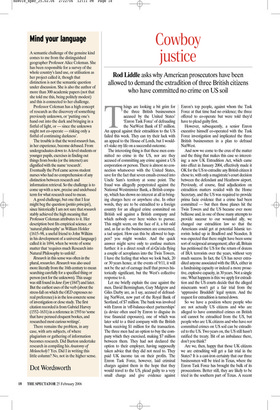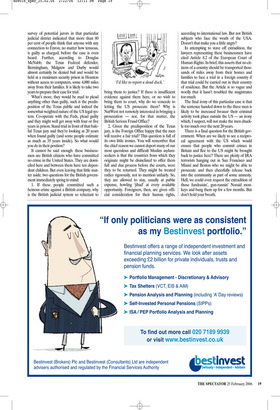Cowboy justice
Rod Liddle asks why American prosecutors have been allowed to demand the extradition of three British citizens who have committed no crime on US soil Things are looking a bit grim for the three British businessmen accused by the United States’ ‘Enron Task Force’ of defrauding the NatWest Bank of $7 million. An appeal against their extradition to the US failed this week. They can try their luck with an appeal to the House of Lords, but I wouldn’t stake my life on a successful outcome.
The interesting thing is that these men committed no crime in the US, nor are they accused of committing any crime against a US corporation or person. There is almost no connection whatsoever with the United States, save for the fact that seven emails crossed into Uncle Sam’s territory at some point. The fraud was allegedly perpetrated against the National Westminster Bank, a British company, which has shown no interest at all in bringing charges here or anywhere else. In other words, they are to be extradited to a foreign country for an alleged crime committed on British soil against a British company and which nobody over here wishes to pursue. This might seem, on the face of it, a bit odd and, as far as the businessmen are concerned, a tad unjust. How can this be allowed to happen? you might wonder. And the quick answer might serve only to confuse matters further: it is a direct result of al-Qa’eda flying a couple of aeroplanes into the Twin Towers. I have the feeling that when we look back, 20 or 30 years hence, at the events of 9/11, it will not be the act of carnage itself that proves historically significant, but the West’s collective response to it.
Let me briefly explain the case against the men. David Bermingham, Gary Mulgrew and Giles Darby are, as I say, accused of defrauding NatWest, now part of the Royal Bank of Scotland, of $7 million. The bank was involved with Enron in ‘off-balance-sheet partnerships’ (a device often used by Enron to disguise its true financial exposures), one of which was later sold to a third company with the British bank receiving $1 million for the transaction. The three men had an option to buy the company which they exercised, making $7 million between them. They had not declared the option to their employer, having supposedly taken advice that they did not need to. They paid UK income tax on their profits. The Enron Task Force, however, laid criminal charges against them in the hope that they would travel to the US, plead guilty to a very small charge and give evidence against Enron’s top people, against whom the Task Force at that time had no evidence; the three offered to co-operate but were told they’d have to plead guilty first.
However, subsequently, a senior Enron executive himself co-operated with the Task Force investigation and implicated the three British businessmen in a plan to defraud NatWest.
And now we come to the crux of the matter and the thing that makes this case so interesting: a new UK Extradition Act, which came into effect in January 2004, effectively made it OK for the US to extradite any British citizen it chose to, with only a magistrate’s court decision between the defendant and Heathrow airport. Previously, of course, final adjudication on extradition matters resided with the Home Secretary, and the US was required to provide prima facie evidence that a crime had been committed — but then those planes hit the Twin Towers and the US became ever more bellicose and, in one of those many attempts to provide succour to our wounded ally, we changed our extradition law so that the Americans could get at potential Islamic terrorists holed up in Bradford and Neasden. It was expected that there might have been some sort of reciprocal arrangement; after all, Britain has petitioned the US for the return of dozens of IRA terrorists over the years, without very much success. In fact, the US has never extradited anyone associated with the IRA, either in a fundraising capacity or indeed a more proactive, explosive capacity, in 30 years. Not a single one. What happens is this: we apply for extradition and the US courts decide that the alleged miscreants won’t get a fair trial from the ‘upprussive Bruddish’ legal system. And the request for extradition is turned down.
So we have a position where people who are not actually US citizens and who are alleged to have committed crimes on British soil cannot be extradited from the US, but people who are UK citizens and who have not committed crimes on US soil can be extradited to the US. Two years on, the US still hasn’t ratified the treaty. Bit of an imbalance there, don’t you think?
Are we, then, happy that those UK citizens we are extraditing will get a fair trial in the States? It is a cast-iron certainty that our three businessmen will be tried in Texas, where the Enron Task Force has brought the bulk of its prosecutions. Better still, they are likely to be tried in the southern part of Texas. A recent survey of potential jurors in that particular judicial district indicated that more than 80 per cent of people think that anyone with any connection to Enron, no matter how tenuous, is guilty as charged, before the case is even heard. Further, according to Douglas McNabb, the Texas Federal defender, Bermingham, Mulgrew and Darby would almost certainly be denied bail and would be held at a maximum security prison in Houston without access to computers, some 4,000 miles away from their families. It is likely to take two years to prepare their case for trial.
What’s more, they would be mad to plead anything other than guilty, such is the predisposition of the Texas public and indeed the somewhat weighted nature of the US legal system. Co-operate with the Feds, plead guilty and they might well get away with four or five years in prison. Stand trial in front of that baleful Texas jury and they’re looking at 20 years when found guilty (and some people estimate as much as 35 years inside). So what would you do in their position?
It cannot be said enough: these businessmen are British citizens who have committed no crime in the United States. They are domiciled here and between them have ten dependent children. But even leaving that little matter aside, two questions for the British government immediately spring to mind: 1. If these people committed such a heinous crime against a British company, why is the British judicial system so reluctant to bring them to justice? If there is insufficient evidence against them here, or no wish to bring them to court, why do we concede to letting the US prosecute them? Why is NatWest not remotely interested in bringing a prosecution — nor, for that matter, the British Serious Fraud Office?
2. Given the predisposition of the Texas jury, is the Foreign Office happy that the men will receive a fair trial? This question is full of its own little ironies. You will remember that the chief reason we cannot deport many of our most querulous and difficult Muslim asylumseekers is that the countries from which they originate might be disinclined to offer them full and due process before the courts, were they to be returned. They might be treated rather rigorously, not to mention unfairly. So, they are allowed to stay, usually at public expense, howling ‘jihad’ at every available opportunity. Foreigners, then, are given official consideration for their human rights, according to international law. But not British subjects who face the wrath of the USA. Doesn’t that make you a little angry?
In attempting to stave off extradition, the lawyers representing these businessmen have cited Article 8.2 of the European Court of Human Rights. In brief, this asserts that no citizens of a country should be transported thousands of miles away from their homes and families to face a trial in a foreign country if that trial could be carried out in their country of residence. But the Article is so vague and woolly that it hasn’t troubled the magistrates too much.
The final irony of this particular case is that the sentence handed down to the three men is likely to be increased because their criminal activity took place outside the US — an irony which, I suspect, will not make the men chuckle too much over the next 20 years.
There is a final question for the British government. When are we likely to see a reciprocal agreement with the US which would ensure that people who commit crimes in Britain and flee to the US might be brought back to justice here? There are plenty of IRA terrorists hanging out in San Francisco and Miami and Boston who we might be able to prosecute and then cheerfully release back into the community as part of some amnesty. Hell, we could even request the extradition of those fundraisin’, gun-runnin’ Noraid monkeys and bang them up for a few months. But don’t hold your breath.



































































 Previous page
Previous page